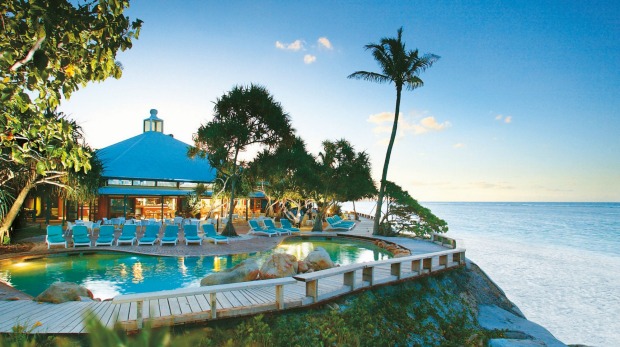 Louise Southerden
Louise Southerden
For full functionality of this site it is necessary to enable JavaScript. Here are the instructions how to enable JavaScript in your web browser.

Highlight: Unchaperoned wildlife encounters, particularly with turtle hatchlings, just metres from the resort.
Lowlight: Leaving the island.
Heron Island Resort, Queensland
Heron Island is a coral cay at the southern end of the Great Barrier Reef that's small enough to walk around in 20 minutes and big on nature, with world-class dive sites, hundreds of thousands of seabirds and marine turtles that nest on its dazzling white beaches every summer. The 109-room resort, one of the longest-running in Australia (it opened in 1936), is the only tourist accommodation; there's also a University of Queensland research station for visiting students and scientists.
This low-rise Advanced Eco-certified resort, which stretches along the northern side of the island, has been purpose-built to minimise visitor impact and maximise enjoyment and understanding of its natural environment. So in addition to typical resort offerings such as a bar, spa (Aqua Soul Spa, which uses natural Australian Li'tya products) and saltwater pool, you'll find an information centre, dive boats, marine biologist guides and free leaflets about the island's birds, plants, turtles, sharks and coral reef.
The décor is more holiday-rental than luxury resort, in a good way. My friend and I have an upstairs Beachside Suite which has a comfortable living room (two built-in daybeds, a cane chair, tea-making facilities and a well-stocked minibar) and, behind a Japanese-style shoji screen, a bedroom with king-size bed. Tiled floors and no room keys enhance the casual, beachy vibe – although you can't lock your door from the inside, which might be an issue for solo female travellers.
Sliding glass doors lead to a large balcony where we're eye-to-eye with about 30 black noddy terns nesting in nearby pisonia trees. The bathroom has Sukin organic toiletries, a hair dryer and shaving plug.
There are turtle touches everywhere: turtle-themed "Do not disturb" signs that say "Make tracks", information cards explaining turtle-watching guidelines and an orange outside light to avoid disturbing nesting turtles after dark. As part of the low-impact ethos, there's no aircon, just ceiling fans. There's no television, Wi-Fi or mobile reception, either (just a pay phone outside reception).
One of the best things about Heron Island is that your accommodation doesn't shield you from the natural goings-on you've come to experience. You'll fall asleep to the eerie "oohs" and "aahs" of muttonbirds (wedgetailed shearwaters), wake to the chirps of noddy terns and dine behind aviary-like netting at the restaurant (to prevent birds flying in unannounced). Expect to be pooped on at least once; it's good luck, the staff say. (In any case, it washes off.) Also good to know: as of April last year the resort no longer has daylight saving time in summer; it's permanently on Queensland time.
There are two places to dine on the island: Shearwater Restaurant and Baillie's Bar. Our all-inclusive rate covers delicious, un-fancy buffet breakfasts and dinners and a la carte lunches at Shearwater with an emphasis on fresh, local seafood. All guests receive a "Happy Hour anytime" card to redeem at Baillie's, a nice touch given that evening turtle-watching can collide with rigid happy hours.
The best time to visit is when the nesting turtles, hatchlings and migrating seabirds overlap: January-March. The daily "Heron Times" details each day's weather forecast, tides and complimentary activities, which include island, bird and reef walks and tours of the research station. There are also dive and snorkel trips three times a day. New this year are guided around-island tours in clear kayaks (all the better to see the reef you're paddling over), stand-up paddleboards for rent and a semi-submersible submarine that takes the glass-bottom boat experience to a whole new undersea level.
The beauty of Heron Island Resort is that you get to stay right on one of the Seven Wonders of the World, maximising your nature-time on land and sea. Where else can you see the timeless spectacle of a clutch of baby turtles scuttling to the water's edge – between sunset cocktails and a buffet dinner?
Heron Island is accessible from Gladstone, which is an hour's flight north of Brisbane. There are two ways to get there from Gladstone: the two-hour launch, which costs $50 each way, and the seaplane, which takes 25 minutes, costs $291 per person and allows you to wade ashore and arrive on the island barefoot.
Rooms from $288 a night, suites from $548 a night, including breakfast. Three-night stays during turtle season (October-March) from $477 a person including breakfast, $687 a person including all meals. See heronisland.com
The writer was a guest of Delaware North.